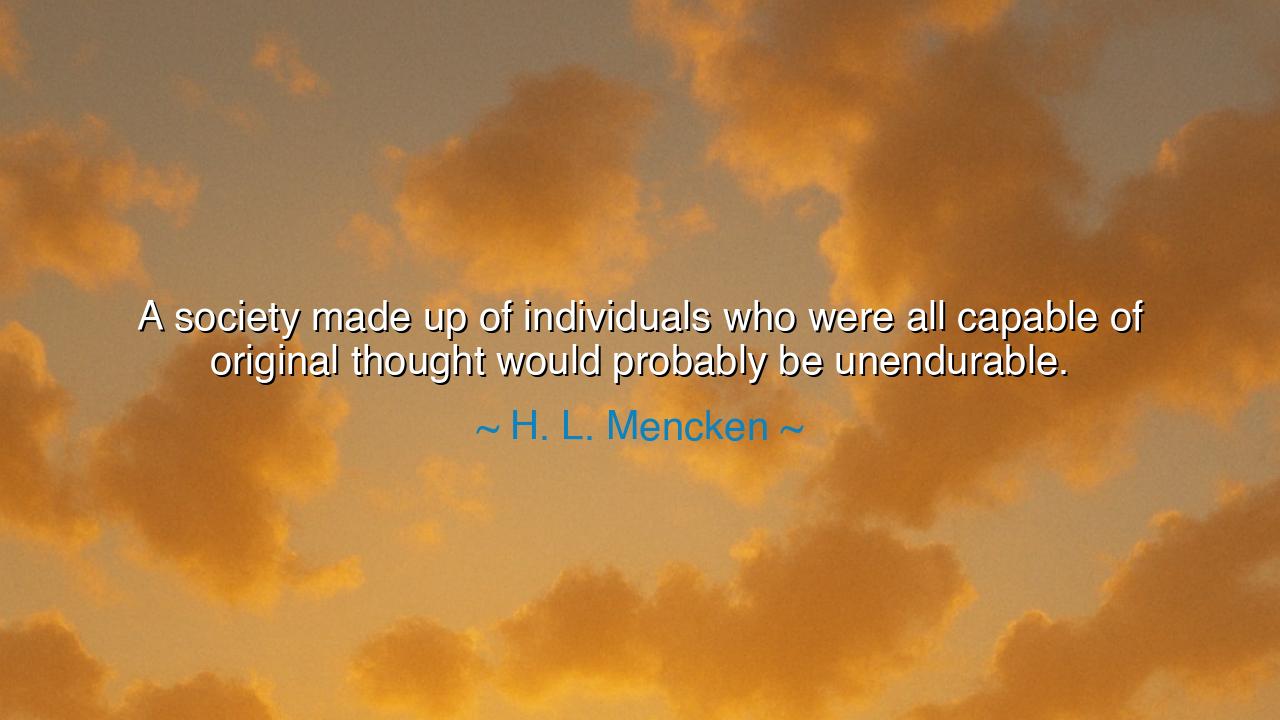
A society made up of individuals who were all capable of original
A society made up of individuals who were all capable of original thought would probably be unendurable.






Hear the words of H. L. Mencken, sharp observer of human folly, who declared: “A society made up of individuals who were all capable of original thought would probably be unendurable.” These words strike like lightning across the plains of the mind, for they reveal a paradox at the heart of human life. We honor original thought, we praise invention and genius, yet Mencken reminds us that if all men and women burned with that relentless fire, the world would not be harmonious—it would be chaos, a storm with no harbor.
For what is original thought but the refusal to follow, the courage to question, the strength to shatter what is accepted? If every individual lived thus, no tradition would stand, no custom would endure, no order would survive. The temple would be torn down before the stones were laid, the song interrupted before the chorus began. Innovation is the spark of progress, but when multiplied endlessly, it becomes wildfire, burning not only the old, but the very fabric that binds a society together. Mencken, with sardonic wisdom, saw this truth: genius is rare because it must be rare—too much of it would make the world unbearable.
Consider the trial of Socrates in ancient Athens. His original thought was relentless—questioning gods, laws, and the very meaning of justice. To some, he was the gadfly awakening the city; to others, he was the destroyer of harmony, corrupting the youth with dangerous ideas. Athens, though proud of its democracy, could not endure too much questioning, too much original thought, and so it condemned him to drink the hemlock. His death reveals the fragile balance: a society needs new ideas, yet it also fears being drowned in them.
Or look to the French Revolution. The people, weary of monarchy and privilege, cried out for liberty and equality. Yet when original thought erupted everywhere, when every man became his own prophet and every woman her own philosopher, the order of France collapsed into blood and terror. The guillotine became the altar of too much originality, and the revolution devoured its children. In time, order was restored not by endless debate, but by the iron hand of Napoleon. Thus history testifies: original thought must be tempered, lest it dissolve society into madness.
The wisdom of Mencken’s quote is not to scorn originality, but to warn of its excess. Just as salt gives flavor but too much spoils the meal, so too does genius enrich society but overwhelm it when multiplied beyond measure. A stable world requires balance: the few who question and create, and the many who preserve and sustain. Without originality, we stagnate. Without continuity, we collapse. The greatness of a people lies in weaving both together.
The lesson for us is clear: honor original thought, but recognize that it is not the burden of all. Do not despise those who preserve tradition, nor glorify only those who shatter it. Understand that your community needs builders as well as dreamers, guardians as well as rebels. The harmony of society lies not in everyone thinking differently, but in everyone contributing according to their gift.
Therefore, O listener, let your actions be these: cultivate your own originality, but wield it with wisdom. Question boldly, yet honor what gives life and stability. Do not seek to remake the world each morning, for no harvest grows in soil overturned each day. Instead, let originality guide you when the path is lost, and let tradition guide you when the path is clear. For a society where every individual is a prophet may be unendurable—but a society that silences every prophet is doomed. The art of living is to walk between these two extremes, balancing flame and stone, vision and endurance.






AAdministratorAdministrator
Welcome, honored guests. Please leave a comment, we will respond soon